How do plant roots respond to higher temperatures? – An interview with Aneesh Lale
November 9, 2020
Aneesh Lale is a PhD student on the Palaeobenchmarking Resilient Agricultural Systems (PalaeoRAS) project Why did you decide to do a PhD? What were you doing before? My father, having never found the time to complete his post-graduation, always encouraged me to learn as much as possible. My inquisitive nature, in addition to ample support from my parents, made a PhD …
Modelling ancient Mayan farming – An interview with Rik Rutjens
November 5, 2020
Rik Rutjens is a PhD candidate with the Palaeobenchmarking Resilient Agricultural Systems (PalaeoRAS) project. Photo (right) by Karla Hernandez-Aguilar Why did you decide to do a PhD? What were you doing before? After completing my undergraduate and masters degrees at Eindhoven University of Technology in the Netherlands, I could not decide which path to take for my future: research or industry? Eventually, a research internship at San Diego …
Computer Vision and plants – An interview with Bowen Deng
November 2, 2020
Bowen Deng is a PhD student on the Palaeobenchmarking Resilient Agricultural Systems (PalaeoRAS) project Why did you decide to do a PhD? What were you doing before? All my life, I have had a fascination with computing and technology. I have always enjoyed keeping pace with the latest advances in technology and have remained amazed at the speed of computerized developments over …
Droughts and their effects on agriculture – An interview with Amit Kumar
October 23, 2020
Amit Kumar is a PhD student on the Palaeobenchmarking Resilient Agricultural Systems (PalaeoRAS) project Why did you decide to do a PhD? What were you doing before? Before coming to the UK, I worked for the National Institute of Hydrology (NIH) in Roorkee (India) as a Senior Research Fellow for two years. NIH is a leading research institute working under the Ministry of Water Resources, Govt. of India. Earlier, I had completed my Masters in …
Agricultural systems in The Fertile Crescent – An interview with Ali Ben Mustapha
October 21, 2020
Ali Ben Mustapha is a PhD student on the Palaeobenchmarking Resilient Agricultural Systems (PalaeoRAS) project Why did you decide to do a PhD? What were you doing before? I was born into a farmer’s family in north Tunisia and I love farming and the land. My ambition is to conduct research that will help farmers take the right decisions to improve the productivity and sustainability of their agricultural systems. This PhD allows me to …
Indigenous Farming in Mexico and Belize – An interview with Karla Hernandez-Aguilar
October 15, 2020
Karla G. Hernandez-Aguilar is a PhD student on the Palaeobenchmarking Resilient Agricultural Systems (PalaeoRAS) project Why did you decide to do a PhD? What were you doing before? Before joining the University of Nottingham, I worked in Southern Belize for two and a half years as the Protected Areas Program Director at an NGO called Ya’axche Conservation Trust. I established working relationships with many indigenous …
Resistance to disease in tropical crops – an interview with Professor Pathmanathan Umaharan
September 17, 2020
Professor Pathmanathan Umaharan (‘Uma’) is the Director of the Cocoa Research Centre, University of the West Indies. The Future Food Beacon is proud to welcome him as an Honorary Professor for the 2020/21 academic year. We spoke with Uma about his research career, current projects, and collaborations with Future Food. Tell me about your work. What is your research about? …
Transforming chicken feed for the future: an interview with Hannah Dallas
July 8, 2020
Hannah Dallas is a PhD candidate with the Future Proteins Platform. Her project is titled The application of methanotroph bacteria Methylococcus capsulatus as chicken feed. Hannah is supervised by: Dr Ying Zhang, Prof Michael Lee, and Tithira Wimalasenaf. Prior to joining UoN, Hannah completed a Masters in Medicinal and Pharmaceutical Chemistry at the University of …
Understanding genetic variation in winged bean: an interview with Niki Tsoutsoura
July 1, 2020
Niki is a PhD candidate with the Future Proteins Platform. Niki holds an MSc. in Crop Improvement from the University of Nottingham. During her MSc studies, she became familiar with underutilised crops like winged bean. Underutilised crops are relatively underexploited as they have low economic importance or agricultural significance in developed economies, therefore they receive …
Reducing protein malnourishment: an interview with Joe Godrich
Joe Godrich is a PhD candidate with the Future Proteins Platform. Joe’s project is titled: Natural protein ingredients – the impacts of reduced refinement. Joe is supervised by Dr Jo Gould, Prof Tim Foster, and Dr Peter Rose. The project investigates the structure-function relationship of protein produced without high refinement. Prior to joining the Future …

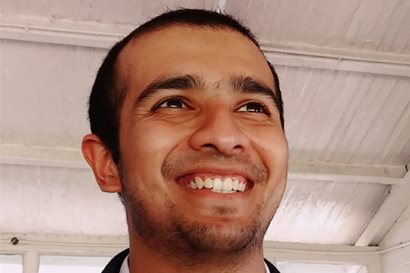
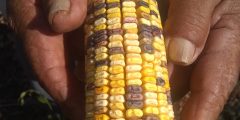



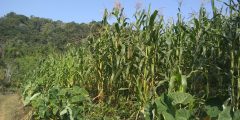
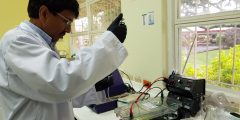
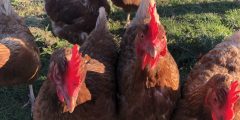


Recent Comments